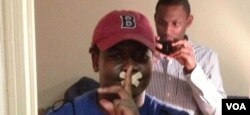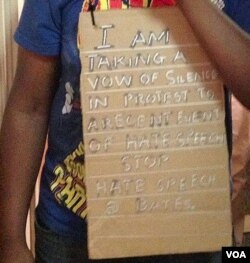I never expected to be a victim of hate speech at a progressive institution like Bates College. I had heard hate speech before – “Bitch!” “Fag!” “Nigger!” “Cracker!” – but it was always something people shrugged off, convincing ourselves it was okay because we did not want to speak up. It was a traumatizing experience when, for the first time in my short life, someone used a racial slur directly at me.
It was a Saturday night and my roommates and I were chatting when a young lady walked into our room. I had seen her at one of the many orientation programs for incoming students and we sometimes hung out on her floor. Except for those encounters and the occasional hellos we exchanged around campus, I did not know her. She waved hello to us from the doorway and then closed the door to our room to chat to her friends who were outside.
A few seconds later, I laughed at something one of my roommates had said and I guess she thought I was laughing at her because she walked back into the room, looked at me, and asked, “Why are you laughing, nigger?”
It took my mind a few seconds to process what had happened. Then it registered. She had used a racial slur and it was directed to me. Realizing the gravity of the matter, her girlfriends forcefully pulled her out of our room. I was left upset and confused.
Should I retaliate with a verbal attack? I knew that would not help; it would only exacerbate the matter. So I walked out of the room to prevent myself from acting on my emotions and sought solace.
What to do next?
I had never really paid attention to skin color in my day to day interactions. My skin pigment was different, but obviously that did not make me inferior to anyone else. But this encounter made me more conscious about my skin color. Now I had been made aware that there were people in my supposedly progressive community who judged other human beings based on that trait.
I was not sure what course of action to take next but I was certain that I wanted to handle the unfortunate incident in a mature and responsible manner.
I sought guidance and counsel from my Junior Advisor, an upper classman who lives with freshmen and advises them, who referred me to the school’s Office of Diversity and Inclusion. They were extremely helpful. They spoke to me about the encounter and organized a session with an in-house psychologist.
They also gave me the chance to decide on how I wanted the matter to be handled, which I very much appreciated. I insisted that they talk to the perpetrator and enlighten her, but I advised them not to take any disciplinary action because I did not want the incident to affect the dynamics of our friend group.
However, I didn’t want to leave the matter at that. I felt certain that I was not the first student at Bates College to experience hate speech, and I made it my mission to enlighten the Bates community. I wanted to do something that would create dialogue about the matter among my peers and faculty alike.
I did some research on peaceful demonstrations that foster conversation and found an articulate and powerful means of demonstration - the vow of silence.
My day of silence
I decided I was going to take a 12 hour vow of silence and move around campus with a placard that read “I am taking a vow of silence in protest to a recent incident of hate speech. Stop hate speech @ Bates.” I emailed my professors the night before to alert them of the protest and that I would be unable to contribute to class discussions.
I did not know what sort of reaction to expect from the Bates community, which made me a bit nervous. I was hoping people would take time to read the placard and maybe ask me questions about the incident and hate speech in general.
On the day of the vow of silence, I walked out of my dorm with a cardboard placard hanging around my neck.
The response was overwhelming. A lot of people I met on the day smiled and stopped to read the placard. Some asked me questions: “What is hate speech?” “Did this happen to you?” “Do things like this happen at Bates?” Because I was bound by the vow of silence I could not answer any of those questions. I just gave my audience a hearty smile or scribbled a note on a piece of paper.
The highlight was when I bumped into Clayton Spencer, the president of Bates. She too, stopped and read the placard and expressed her regret that I had been a victim of hate speech.
At 8pm I ended my silence. I was glad I had taken the vow of silence, and felt like I had helped initiate conversation on the topic. Maybe I had even helped change people’s mindsets on issues related to hate speech on campus. The biggest lesson I drew from the experience is that unfortunate incidents can be great opportunities to teach one’s community, and can be turned into a learning experience rather than becoming a feedback loop of negative energy.
Am I conditioned for a future racial slur? No. If it happens again I am sure it will be as hurtful as it was the first time. But I know that by having the courage to help those who have misconceptions I am helping to build the progressive community I want.





